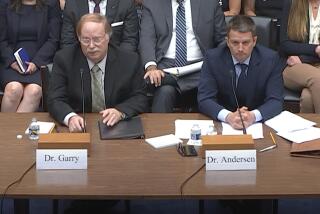Was Cigarette Executives’ Testimony a Smoke Screen? : Tobacco: U.S. is probing whether they lied to Congress and regulators about nicotine.
- Share via
WASHINGTON — The Justice Department has launched criminal investigations here and in New York to probe allegations that cigarette industry executives may have lied to Congress and federal regulators about their knowledge of nicotine’s addictive properties.
Department officials, who spoke on condition of anonymity, said a federal grand jury in New York is investigating possible “securities violations” by Philip Morris, the world’s largest tobacco company.
They declined to say what they meant by that. They also would not confirm a Wall Street Journal report Tuesday that the probe seeks to determine whether Philip Morris concealed from regulators company studies on the effects of nicotine and information about its control of nicotine levels in cigarettes.
In addition, the officials said, a criminal grand jury here soon will hear testimony about whether tobacco industry executives committed perjury during April, 1994, hearings by a House subcommittee investigating manipulation of nicotine content in cigarettes. Bringing the case to a grand jury expands to a full-blown investigation an inquiry initiated by the Justice Department earlier at the request of Rep. Martin T. Meehan (D-Mass.) and six other House members.
“The Justice Department has a responsibility to determine if the industry knowingly lied to Congress and purposely engaged in massive fraud and disinformation to thwart public health measures,” Meehan said Monday. “Eight out of 10 smokers want to quit, and they can’t because they are addicted to nicotine. The evidence suggests they are addicted because the tobacco companies intentionally manipulate nicotine levels.”
Tobacco companies have denied repeatedly that they “spike” their products to alter nicotine content. At the 1994 hearings, William I. Campbell, then-chief executive of Philip Morris, said, “Philip Morris does not manipulate nor independently control the level of nicotine in our products.”
Philip Morris Monday night released a statement saying it “knows of no grand jury investigation” related to Meehan’s inquiry about perjury.
The company confirmed that it had received a subpoena for some internal documents from the U.S. attorney in New York after the New York Times published a June 8 article “about supposedly secret research which we refuted in an as-yet-unpublished letter to the Times. . . . We believe Congressman Meehan’s allegations as well as those contained in the New York Times article are wholly without merit.”
News of the grand jury probes came as President Clinton and senior White House aides discussed possible strategies for limiting smoking by young people.
The Washington Post reported Tuesday that the President is weighing two different policy options: allowing the Food and Drug Administration to classify tobacco as a drug subject to federal regulation, or using the threat of regulatory action to force the industry to make it harder for minors to obtain cigarettes and to halt advertising aimed at youth audiences. He reportedly is leaning toward the voluntary approach.
The embattled industry also came under renewed fire Monday from Rep. Henry A. Waxman (D-Los Angeles), a longtime adversary who chaired the House subcommittee hearings last year.
Addressing the House, Waxman read from what he identified as internal Philip Morris documents. One of them described research on the pharmacology of nicotine that included tracking Virginia schoolchildren to study connections between childhood hyperactivity and later teen-age smoking.
The documents appeared to be the latest examples of evidence from Philip Morris’s own files showing that the company’s research revealed that nicotine affects the bodies, brains and behavior of smokers.
More to Read
Sign up for Essential California
The most important California stories and recommendations in your inbox every morning.
You may occasionally receive promotional content from the Los Angeles Times.













